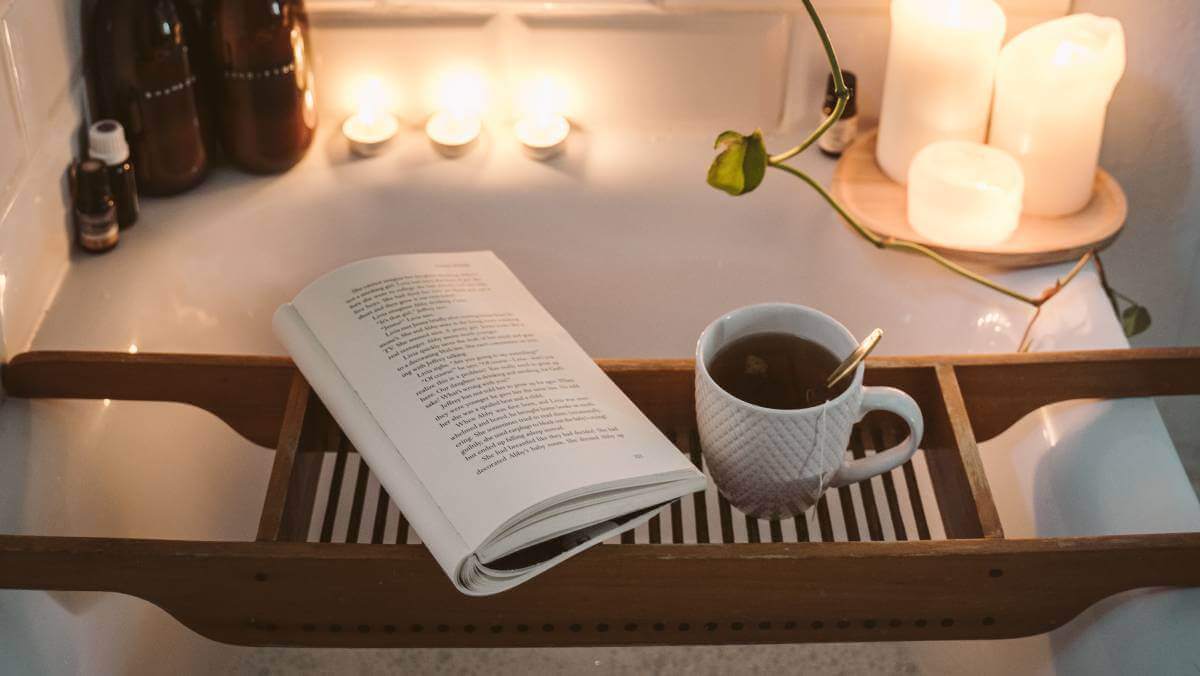Plenty of us find it difficult to juggle the demands of modern life. Our always-on culture makes it hard to switch off after a busy day. From unanswered texts to unopened emails, there’s plenty that can play on your mind, eat into your precious downtime and negatively impact your sleep.
When Friday night arrives, it can be tempting to reach for a bottle of wine to de-stress, but there are healthier ways to wind down. We asked some of our favourite people in the wellness community to share how they choose to care for themselves after a busy week. Here’s what they said.
1. Get outdoors

“For me it’s all about getting outdoors, and nothing beats a hearty walk armed with a coffee bought en route,” says nutritionist Rob Hobson. “I also find a walk helps to break up the evenings, which can feel really long if you have been indoors all day stressing over deadlines. I find cooking hugely relaxing, and I often start looking for supper inspiration first thing in the morning as a nice work distraction.”
Dr Meg Arroll (drmegarroll.com), psychologist and co-author of The Shrinkology Solution, agrees on the power of the great outdoors. “I nurture my mind and body with nature,” she says. “This doesn’t mean going on an hour-long ramble. I simply take a moment outside and observe – what can I see, hear, smell? Even on cold winter days, there will be many sensations that you can tune into. This very quick ecopsychology technique helps me to release the tensions of a busy week.”
2. Take a hot bath
“Stressful days can mean the sympathetic wing of our nervous system is always switched on,” says personal trainer, Nicola Addison. She says that to wind down and become relaxed, we need to activate our parasympathetic nervous system. “Having a hot bath will do the trick, as the muscles relax when they become warm,” she suggests. If you struggle with insomnia, try adding a few drops of essential oil, such as lavender, to the water.
3. Start writing a gratitude journal

“At the end of the day, I relax in bed with a cup of tea and a notebook,” says psychologist Dr Aria Campbell-Danesh. “Writing down a list of things that you’re grateful for changes your mindset, which impacts your body’s biochemistry.”
According to Dr Campbell-Danesh, keeping a gratitude journal has been found to help lower perceived stress by 28 per cent. And gratitude is associated with 23 per cent lower levels of the stress hormone cortisol.
“Research shows that practising gratitude can also reduce blood pressure, boost your mood and improve your sleep. It’s proof that the pen is mightier than a pint!”
4. Be supplement savvy
“I wind down by getting stuck into a creative project – right now it’s rewriting and editing my sci-fi novel,” says Healthspan medical director Dr Sarah Brewer. If you struggle with sleep, she suggests switching out the wine for a natural supplement. “I take a magnesium supplement to ensure a good night’s sleep, along with a mug of chamomile and honey tea.” (If you’re concerned about deficiencies, remember it’s always best to check in with your doctor.)
“Stress, anxiety and insomnia are common symptoms of magnesium deficiency,” says nutritionist Lola Ross. “I stock up on foods rich in magnesium, such as dark green leaf vegetables, legumes and magnesium-rich mineral water to top up my levels.”
5. Avoid stress-inducing foods

“Stress can be triggered or mediated by certain foods in our diet, producing symptoms such as allergies, anxiety to wakefulness and insomnia,” adds Ms Ross. “So if you are already trying to manage stress, it can be really useful to track your food intake and note any post-eating symptoms. This will help you to reveal patterns and remove any stress-inducing foods.”
Ms Ross says some common food stressors include sugar, caffeine and alcohol, as they stimulate stress hormones, creating an unnatural stress response. “If you are particularly sensitive to caffeine, one of my first recommendations is to cut it out completely for a while,” she says. “Swap coffee for caffeine-free teas or a medicinal mushroom-based coffee such as reishi – a mushroom known for its sedating effects. This may be useful in reducing anxiety or promoting relaxation for a restful nights sleep.”
6. Set a sleep schedule
Between work commitments, Netflix and social occasions, it’s all too easy to find yourself slipping out of healthy sleep habits. If you want to better your chances of getting that all-important eight hours of shut-eye, Ms Ross suggests setting a sleep schedule and sticking to it.
“If stress if interfering with sleep, set up a healthy sleep/wake plan. Go to sleep at a similar time each night, sip a calming tea before bed, such as rose, valerian or lavender tea (to calm the nervous system), and make sure to wake up at the same time every day too.”
How do you wind down after a long week? Share your thoughts in the comments section below.
Also read: Ways to relax without alcohol
– With PA

